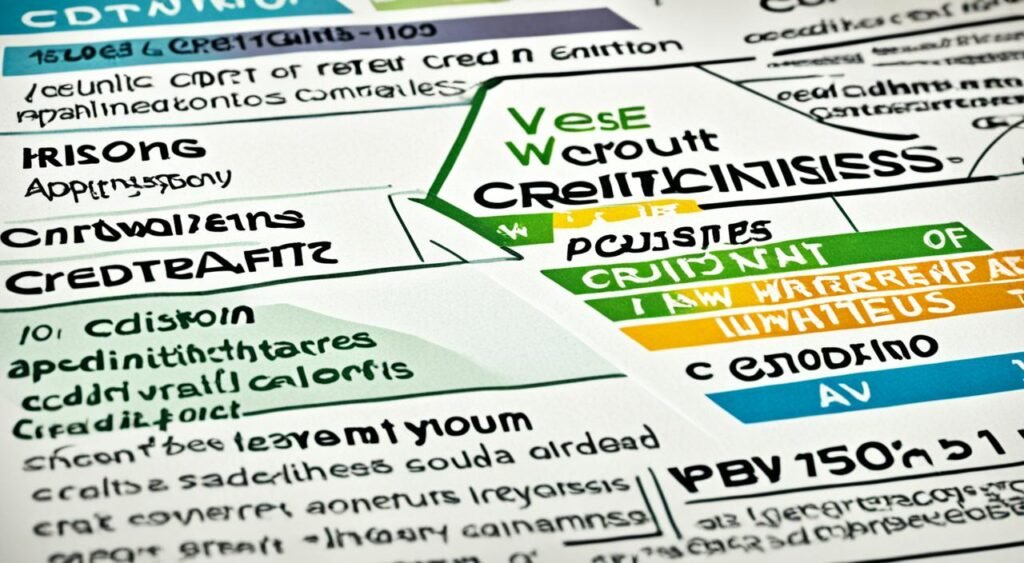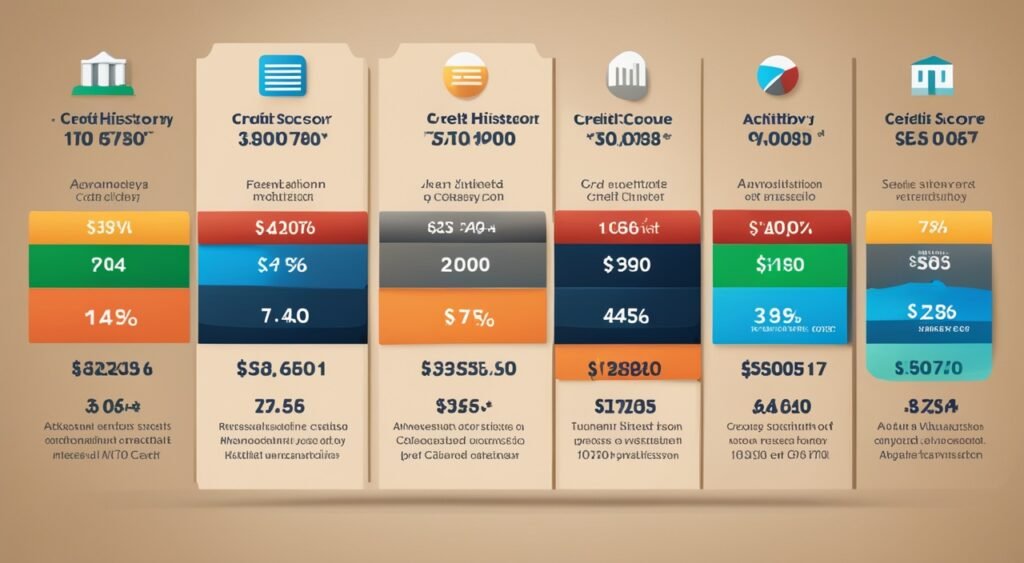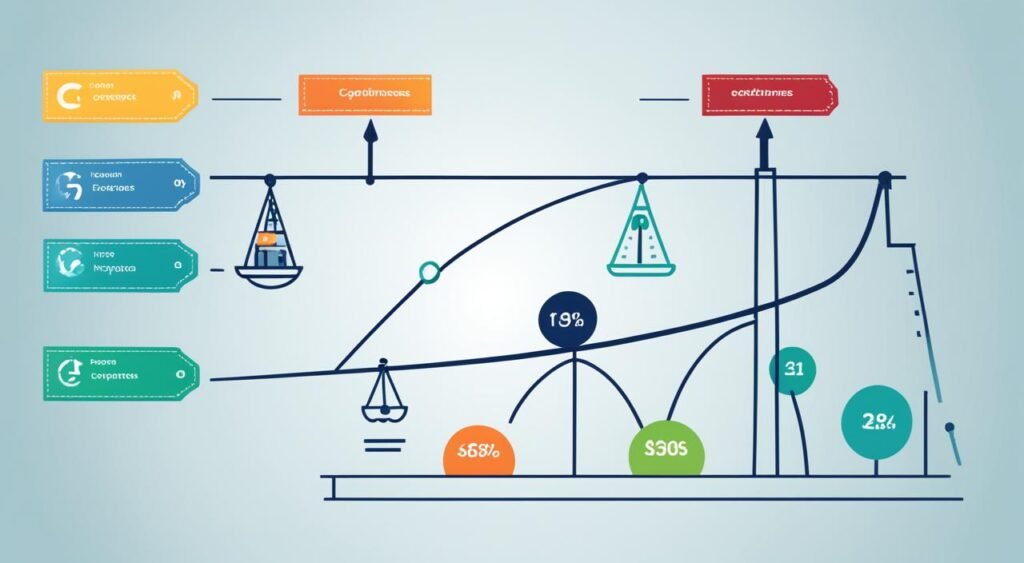Creditworthiness is key for lenders to see if you can pay back loans or keep a credit line. It looks at your credit history, financial stability, and more to see if you might default on debts. Knowing what makes up creditworthiness and how it’s judged is vital for anyone wanting to boost or keep their credit score.
Key Takeaways
- Creditworthiness is a measure of how likely a borrower is to repay their debts on time.
- Factors that determine creditworthiness include credit report, credit score, income, and debt-to-income ratio.
- Maintaining good creditworthiness is crucial for accessing credit, obtaining favorable interest rates, and even securing employment and insurance opportunities.
- Regularly monitoring your credit report and taking steps to improve your creditworthiness can have a significant impact on your financial well-being.
- Lenders use creditworthiness to assess risk and determine the terms of credit, such as the interest rate and credit limit.
Understanding Creditworthiness
Creditworthiness shows how well you can handle debt and financial duties. Lenders look at this to figure out the risk of lending to you. They check your credit score, income, and more to see if you’re likely to pay back on time. A high creditworthiness means you’re seen as a good borrower, which can lead to better credit terms.
What Is Creditworthiness?
Creditworthiness is key when lenders check if you or your business can pay back a loan or credit. It looks at your credit score, payment history, how much credit you use, and your debt. These factors show how likely you are to pay back what you owe.
Key Takeaways
- Creditworthiness shows if you’re likely to pay back what you owe.
- Lenders look at your credit report and credit score to judge your creditworthiness.
- Having good creditworthiness helps get better loan terms and lower interest rates.
Understanding Creditworthiness
Your creditworthiness tells lenders if you’re a good candidate for a loan or credit card. They check your credit report, credit score, and payment history. A high credit score means you’re seen as less risky, making you more creditworthy.
| Factor | Impact on Creditworthiness |
|---|---|
| Payment History | On-time payments show you’re responsible with money. |
| Credit Utilization | High credit use can hurt your creditworthiness. |
| Debt Levels | High debt makes you seem riskier to lenders, lowering your creditworthiness. |
Boosting your creditworthiness can lead to better loan deals, lower interest rates, and easier credit approval.
Factors That Determine Creditworthiness
Lenders look at several key factors to see if someone is creditworthy. This is important when borrowing money or getting credit. The main factors are a person’s credit report and credit score.
Credit Report and Credit Score
A credit report from Equifax, Experian, and TransUnion gives lenders info on your credit history. It shows credit accounts, payment history, and any marks like late payments. Lenders use this info and credit scoring models like FICO to see if you’ll pay back the loan.
The credit score shows how creditworthy you are. Scores from 800 to 850 mean you’re less likely to default. This makes lenders more likely to offer you better rates and terms.
Income and Debt-to-Income Ratio
Lenders also look at your income and debt-to-income (DTI) ratio. They want to make sure you can pay all your debts, including the new loan. The DTI ratio is your total monthly debt payments divided by your income. A ratio under 35% is better.
By looking at these factors, lenders can decide if you’re creditworthy. This helps them know if you can repay a loan. It makes sure both the borrower and the lender benefit financially.
Why Does Creditworthiness Matter?

Creditworthiness is key in our financial lives. It helps decide if you get loans, credit cards, and other credit. It also affects the interest rates and terms you get. The better your creditworthiness, the more likely you are to get approved and the better the rates and terms you’ll get. This can save you a lot of money over time.
But creditworthiness is not just for getting loans. It also affects employment, insurance premiums, business funding, and even professional licenses or certifications. Employers look at credit scores to see if you’re reliable and responsible. Insurers use them to set insurance rates. Lenders also check your creditworthiness when looking at business funding requests.
“Maintaining a strong creditworthiness is essential for financial security and success in today’s world.”
Creditworthiness shows how financially trustworthy and responsible you are. By understanding its importance and improving it, you can get better opportunities, lower costs, and reach your financial goals faster.
Checking Your Creditworthiness

Keeping a good credit score is key to your financial health. It’s important to check your credit reports and scores often. The big three credit reporting agencies – Equifax, Experian, and TransUnion – play a big role in this.
Credit Reporting Agencies
These agencies gather and keep track of credit data on people. Lenders use this data to decide if you’re creditworthy. By looking at your credit reports, you can see what affects your credit score and overall creditworthiness.
Accessing Your Credit Reports
You can get a free copy of your credit report from each of the three big agencies every year. Just visit AnnualCreditReport.com to get them. Also, Credit Karma and Credit Sesame let you check your credit score for free. This helps you spot any issues with your creditworthiness.
It’s crucial to check your credit reports for accuracy. This helps you keep your financial health strong. It also helps you make smart choices when borrowing, renting, or looking for a job.
How to Improve Your Creditworthiness
Improving your creditworthiness is key for getting good loan terms and opening doors. By focusing on important factors, you can make your credit better. This shows lenders you’re reliable.
Pay Bills on Time
Paying bills on time is a big way to boost your creditworthiness. Your payment history is a big part of your credit score. So, paying bills by the due date helps a lot. Late or missed payments hurt your creditworthiness, so pay on time.
Reduce Debt and Utilization
Lowering your debt and credit card balances helps too. Keeping your credit card use below 30% or 10% shows you’re not overusing credit. Also, a lower debt-to-income ratio shows you can handle your bills well.
Monitor Your Credit
Checking your credit reports and scores often is key. Look for mistakes and fix them with the credit bureaus. This keeps your credit right. Knowing your credit status helps you improve it over time.
These strategies help you manage your creditworthiness better. Remember, keeping good credit is an ongoing task. But, the benefits are worth it.
Creditworthiness in Lending Decisions

Getting a loan or credit depends a lot on how creditworthy you are. Lenders look at this to see if you’ll pay back on time. They also use it to set things like interest rates and credit limits.
They check your credit report, score, income, and debt-to-income ratio. These things show if you’re good with money. This helps lenders decide if they should give you credit and what terms to offer.
Having a good creditworthiness means you have a strong credit score, low debt, and pay on time. This makes it more likely you’ll get a loan with good terms. But, if your creditworthiness is poor, with low scores and high debt, you might not get a loan or the terms won’t be good.
Lenders use certain credit criteria to check your creditworthiness. These include:
- Credit report and credit score
- Income and debt-to-income ratio
- Employment and length of time at current job
- Assets and collateral (if applicable)
- Previous loan or credit application history
Knowing how important creditworthiness is can help you improve your finances. This can make getting a loan easier and get you better terms.
| Creditworthiness Factors | Impact on Lending Decisions |
|---|---|
| Credit report and credit score | Shows if you’ve borrowed and paid back well in the past |
| Income and debt-to-income ratio | Shows if you can handle and pay back debt |
| Employment and length of time at current job | Shows you’re stable and your finances are predictable |
| Assets and collateral (if applicable) | Gives lenders something to take if you can’t pay back |
| Previous loan or credit application history | Shows how well you’ve managed credit before |
Understanding creditworthiness helps you improve your finances. This can lead to better loan terms or getting a loan approved.
Risk-Based Pricing and Creditworthiness

Lenders use creditworthiness to set interest rates, fees, and loan terms. This is called risk-based pricing. It matches the risk of the borrower with the lender’s products and prices.
Those with high credit scores get the best rates and terms. Borrowers with lower scores face higher rates and less favorable terms. This shows the risk they pose to lenders.
This method is used for credit cards, personal loans, auto loans, and mortgages. It balances the lender’s risk with the borrower’s credit access.
| Credit Score Range | Interest Rate | Loan Terms |
|---|---|---|
| 720-850 (Excellent) | 4.5% – 6.5% | 10-30 years |
| 680-719 (Good) | 6.5% – 8.5% | 5-20 years |
| 620-679 (Fair) | 8.5% – 12% | 3-15 years |
| 500-619 (Poor) | 12% – 18% | 1-10 years |
Understanding how creditworthiness affects pricing helps borrowers make better choices. It also helps them improve their credit to get better terms and lower costs.
Building and Maintaining Good Creditworthiness
Building a strong creditworthiness takes time and careful credit management. It means paying bills on time, keeping credit card balances low, and not applying for too much new credit. Having a mix of different credit accounts also helps. Being financially smart and consistent with your credit habits is key to a good creditworthiness profile.
On-time payments are crucial for good creditworthiness. This includes paying credit cards, loans, and all financial debts. Missing or paying late can really hurt your credit score and credit history.
It’s also important to keep your credit card balances low compared to your credit limits. This is called credit utilization and is a big part of your creditworthiness. Try to keep your balances under 30% of your limit to show you’re managing your credit well.
Be careful not to apply for too much new credit at once. Each application can lead to a credit inquiry, which can lower your credit score. Instead, work on having a variety of credit accounts, like credit cards, loans, and mortgages, to show you can handle different types of credit.
By following these tips, you can keep building a strong creditworthiness over time. This can lead to better financial opportunities, like lower interest rates, higher credit limits, and more credit products available to you.
The Importance of Creditworthiness Over Time

Your creditworthiness changes as your financial situation and credit habits do. Keeping a good creditworthiness is key. It affects your ability to get credit, get good terms, and make smart credit decisions.
It’s important to check your credit reports and credit scores often. By working on your creditworthiness, you keep your finances healthy for the future.
The Long-Term Impact of Creditworthiness
Your creditworthiness greatly affects your long-term financial goals. A good credit history and credit score lead to better loan terms and lower interest rates. On the other hand, poor creditworthiness limits your options, making it hard to get financing for big purchases like a home or car.
Improving and keeping your creditworthiness in check helps you succeed financially. This means having good credit habits, like paying bills on time and keeping debt low. Also, check your credit report often.
“Maintaining good creditworthiness is essential for long-term financial well-being and security.”
Your creditworthiness shows your financial management and decisions over time. By being careful and proactive, you keep your creditworthiness strong. This supports your financial goals now and in the future.
Also Read: What Is An Emergency Loan And How Do They Work?
Conclusion
Creditworthiness is key when lenders look at loan applications. Knowing what makes you creditworthy, like your credit score and income, helps you improve your financial health. This leads to better access to credit and lower interest rates, which helps with long-term financial stability.
Checking your credit report often and keeping an eye on your credit score is important. Reducing debt and making timely payments also helps. By showing good financial habits, you’re more likely to get loans with better terms.
Improving and keeping up your creditworthiness is an ongoing effort. It requires careful attention and dedication. By focusing on your credit, you set yourself up for success in getting loans, like mortgages or car loans. Understanding and improving your creditworthiness opens doors to more financial opportunities and helps you reach your financial goals.
FAQs
Q: What is creditworthiness and why is it important?
A: Creditworthiness refers to how likely an individual is to repay borrowed money. Factors such as credit score, credit history, and income levels affect creditworthiness. It is important as it helps lenders determine whether to extend credit to an individual.
Q: How can I improve my creditworthiness?
A: You can improve your creditworthiness by paying bills on time, reducing debt obligations, reviewing your credit report regularly, and maintaining a low credit utilization ratio.
Q: What role do credit scores play in determining creditworthiness?
A: Credit scores are used by lenders to determine an individual’s creditworthiness. Higher credit scores indicate greater creditworthiness, while lower scores may pose a higher credit risk.
Q: How does applying for credit impact my creditworthiness?
A: When you apply for credit, a hard inquiry is made on your credit report which can temporarily lower your credit score. It’s a good idea to limit the number of credit applications to maintain your creditworthiness.
Q: Why is it important to review your credit report regularly?
A: Reviewing your credit report regularly allows you to spot errors, detect fraud, and maintain an accurate representation of your credit history, which is crucial for determining your creditworthiness.
Q: What is the role of a credit card issuer in determining creditworthiness?
A: Credit card issuers use credit scoring systems to evaluate applicants’ creditworthiness before approving them for a credit card. Being creditworthy increases the likelihood of approval.
Q: How can credit monitoring services help improve creditworthiness?
A: Credit monitoring services provide regular updates on your credit report and score, helping you track your progress in improving your credit, which in turn enhances your creditworthiness.
Source Links
- https://www.investopedia.com/terms/c/credit-worthiness.asp
- https://www.experian.com/blogs/ask-experian/what-is-creditworthiness/
- https://www.creditkarma.com/advice/i/creditworthiness-what-lenders-look-for
